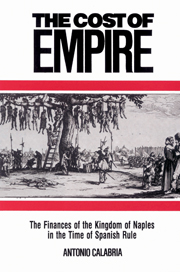Book contents
- Frontmatter
- Contents
- List of figures
- Acknowledgments
- List of abbreviations
- Weights and measures
- Monetary units and exchange rates
- Maps
- Introduction
- 1 The early modern Southern Italian economy
- 2 The fiscal system in early modern Naples
- 3 Government income, 1550–1638
- 4 Government expense, 1550–1638
- 5 The creation of a securities market in the later sixteenth century
- Conclusion
- Appendix I The tables
- Appendix II The sources
- Bibliography
- Index
- Cambridge Studies in Early Modern History
1 - The early modern Southern Italian economy
Published online by Cambridge University Press: 13 November 2009
- Frontmatter
- Contents
- List of figures
- Acknowledgments
- List of abbreviations
- Weights and measures
- Monetary units and exchange rates
- Maps
- Introduction
- 1 The early modern Southern Italian economy
- 2 The fiscal system in early modern Naples
- 3 Government income, 1550–1638
- 4 Government expense, 1550–1638
- 5 The creation of a securities market in the later sixteenth century
- Conclusion
- Appendix I The tables
- Appendix II The sources
- Bibliography
- Index
- Cambridge Studies in Early Modern History
Summary
The Kingdom of Naples [Ambassador Paolo Tiepolo told the Venetian Senate in 1563] is a rather large and reasonably inhabited country; fruitful and abundant in many crops, especially in wheat, not only for its own use but also for many other areas…
Ambassador Tiepolo's sanguine description of the Neapolitan Kingdom attested to the lively expansion of Southern Italian agriculture, to the “Indian summer” buoyancy of the Italian economy after the 1550s. Even more, though, the Venetian ambassador's statement echoed a theme – that of the unbounded fertility of the Southern Kingdom – that was as common as it was to prove durable in early modern descriptions of the Kingdom of Naples.
Some time after Tiepolo's report to the Venetian Senate, in fact, when the signs of economic difficulty in Southern Italy were becoming ever more apparent, a “Delectable and Useful Discourse of the Things that are in the Kingdom of Naples” could still wax rhapsodic about Naples' riches:
This Kingdom produces…all things needed not only to sustain the life of men, but also to bring them ease and pleasure – truly a rare thing [the author of the “Discourse” proclaimed] and one which I think is not to be found in any other Kingdom of which we have news. For it produces grain, barley, legumes, oil, wine, almonds…saffron…and silk not only for its own needs but also to give to other countries in great quantity, as it does in abundance, for a million in gold, with much utility for the people of the Kingdom and for the King…
- Type
- Chapter
- Information
- The Cost of EmpireThe Finances of the Kingdom of Naples in the Time of Spanish Rule, pp. 9 - 36Publisher: Cambridge University PressPrint publication year: 1991
- 1
- Cited by

